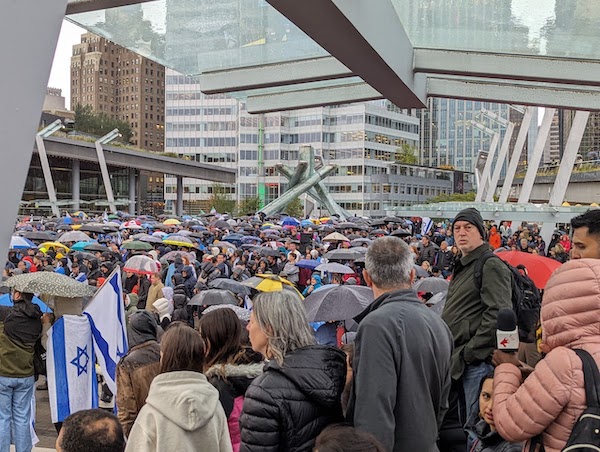בשלב זה ישראל מקבלת תמיכה ממרבית מדינות המערב. אך יש סיכוי שעם ההתקדמות של מבצע צבאי של צה”ל ברצועת עזה, התמיכה תלך ותרד עם עליית הנפגעים בצד הפלסטיני
(photo by Roni Rachmani)
המלחמה הקשה שמתנהלת בימים אלה בין ישראל לחאמס ויכולה להתפשט לחזיתות נוספות, צפוייה להשפיע לרעה על חיי יהודים וישראלים הגרים בקנדה, ארה”ב, אירופה ומקומות אחרים. הם צפויים לעמוד מול איומים שונים של פלסטינים ותומכיהם שמאשימים את ישראל גם במשבר הנוכחי. תומכי הפלסטינים קוראים להקמת מדינה לפלסטינים מהנהר ועד הים – שפירושה המעשי השמדת מדינת ישראל
העולם המערבי כולל צפון אמריקה מלא כיום מיליוני מוסלמים שהיגרו ממדינות ערב לאורך שנים רבות. חלק לא מבוטל מהם ממשיך לשמור נאמנות למוצאם ודתם בצורה פנאטית ורואה בישראל כמדינת אויב
עוד שגרתי בישראל טענתי שהסכסוך בינה ובין הפלסטינים וחלק ממדינות ערב יסכן גם את חיי היהודים והישראלים הגרים מחוץ למדינה. אמרתי אז שלישראל יש גם את האחריות לשמור על היהודים והישראלים, שבחרו לגור במקומות שונים בעולם ובעיקר במערב. ומוטל על ישראל לשקול בזהירות את צעדיה שכאמור יכולים להשפיע לרעה על היהודים והישראלים שגרים בחוץ לארץ
עובדה היא שאנטשימיות נגד יהודים וישראלים ברחבי העולם הולכת וגדלה, וכבר בסכסוך הקשה הנוכחי, נרשם גידול נוסף בשנה נגדם. וזו רק ההתחלה. אני צופה להרעה משמעותית עד סכנת חיים ליהודים והישראלים בצפון אמריקה, אירופה ומקומות אחרים. כבר עתה ידוע על הפגנות גדולות קשות נגד ישראל ותמיכה בפלסטינים. אלה עלולות להחמיר לעימותים פיזיים קשים עם יהודים וישראלים ואף יותר מכך. משטרות בערים רבות בעולם הדקו את ההגנה על מוסדות יהודים שונים ובהם בתי כנסת. נרשמו כבר לא מעט איומים נגד יהודים, ישראלים ומוסדות שונים בעולם ולכן השמירה מאוד חשובה במיוחד בימים טרופים אלה
בשלב זה ישראל מקבלת תמיכה ממרבית מדינות המערב. אך יש סיכוי שעם ההתקדמות של מבצע צבאי של צה”ל ברצועת עזה, התמיכה תלך ותרד עם עליית הנפגעים בצד הפלסטיני. במקביל צפויים היהודים והישראלים ברחבי העולם לסבול מגידול משמעותי באנטישמיות, התנכלויות, ואף מאיומים פיזיים
חברת אייר קנדה מהירה לפטר טייס מוסלמי שהתבטא נגד ישראל וכתב בחשבון הטוויטר שלו: “היטלר גאה בישראל”. מוסטפא איזו השתתף בהפגנה במונטריאול בעד הפלסטינים נגד ישראל והוא אף הצטלם עם צעיף בצבעי דגל פלסטין. זו לא הפעם הראשונה שאיזו מתבטא נגד ישראל ותומך בפלסטינים אך הפעם מתברר שהוא חצה את הגבול ובאייר קנדה מיהרו לפטרו
ראש ממשלת קנדה, ג’סטין טרודו, גינה את מתקפות הטרור נגד ישראל בהתייחסו להתקפה של חמאס על עשרות ישובי עוטף עזה בה נרצחו למעלה מאלף שלוש מאות ישראלים, נפצעו למעלה מארבעת אלפים ונלקחו בשבי קרוב לוודאי כמאה וחמישים אזרחים, חיילים, ועובדים זרים. בהודעה שפרסם בטוויטר אמר טרודו כי פעולות אלימות אלה בלתי מקובלות באופן מוחלט. אנו עומדים לימין ישראל ותומכים באופן מלא בזכות להגן על עצמה. מחשבות שלנו תמיד עם כל אדם שנפגע. חייבים להגן על חיי אזרחים, חתם טרודו את הודעתו. מנהיג האופוזיציה והמפלגה הקונסרבטיבית, פייק פוליוויר, גינה באופן חד משמעי את הפלישה של טרוריסטים של חמאס לישראל ואת האלימות האכזרית שהם הפעילו נגד אזרחים חפים מפשע. לדבריו לישראל הזכות להגן על עצמה בפני התקפות אלה ולפעול נגד התוקפים. מנהיג מפלגת השמאל אן.די.פי ג’גמיט סינג כתב בחשבון הטוויטר כי הוא מגנה את ההתקפות הנוראיות שביצע החמאס בישראל. אסור לעולם לפגוע באזרחים וכל החטופים צריכים להיות מחשוררים באופן מיידי. לדברי סינג יש חשש מההתפתחויות עתה. טרור ואלימות לא יפתרו דבר



